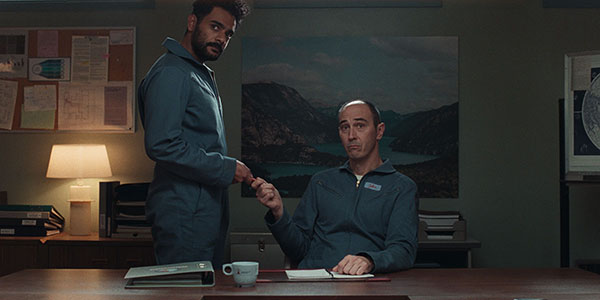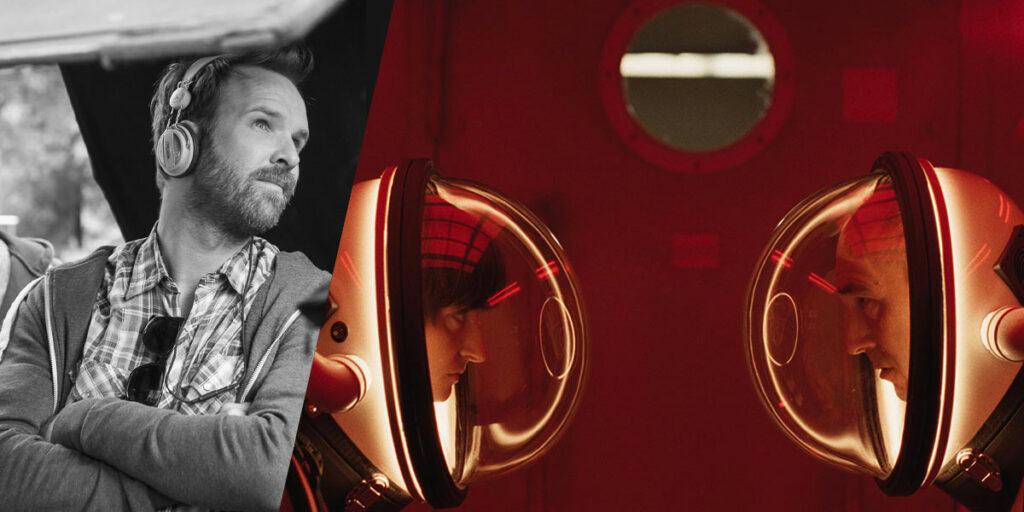Viking premiered at TIFF, and we interviewed director and co-writer Stéphane Lafleur to ask about the film, its meaning, and his process in making it.
Viking is a drama directed and co-written by Stéphane Lafleur, which recently had its world premiere at TIFF. The film features David (Steve Laplante), a physical education teacher whose dreams of travelling to Mars take him to the Viking Society, who run a simulated version of a Mars mission to deal with interpersonal problems between the actual astronauts on their way to Mars. As this “B team” takes on the roles of these real astronauts, tensions rise between them and the Viking Society pushes them further and further to make the experiment successful.
The result is a character study that constantly has you wondering who the characters we’re studying even are. Viking blurs the line between characters and the roles they play, explores the dangers of pushing oneself too far to achieve a dream, and puts a sci-fi coat of paint over an increasingly, quietly intense drama. To delve further into the nature of the film, I got the chance to speak with director and co-writer Stéphane Lafleur and interview him to learn more about his mindset behind this subversive film.
The Characters and Purpose of Viking
In Viking, the characters are supposed to be representing different people. When you were directing the actors, did you have it in your head who they were actually supposed to be in any given moment? Or were you letting them have a say in that as well, or just leaving it be and solely letting the audience determine that?
Stéphane Lafleur: During the writing, we kind of drew the basic lines of all the characters, finding a way to identify the real astronauts, and then building the B team according to those character lines. We cast and characterized the real astronauts and saw if there was something the B team could relate to or try to mimic, or try to reach as a character. I’m not sure it was an intended process, but I remember that the actors had a lot of questions about that sometimes. They’d ask, “What should I do, how am I supposed to react?” But at the same time, the dialogues were really clear and there was a direction to each scene.
Was David the most interesting character for you to write? Or was there a side character who struck you as the most fascinating as you were bringing everyone to life?
S.L.: I think David imposed himself as the one I could relate to in a way, because for me, this film is about a guy pretending to be someone else. And in a way, it’s a film pretending to be another [genre], so I could relate more with this character.
By the end, Viking kind of paints this negative view of the way people involved with space travel are treated. Was that negative outlook something that you intended or what you feel in your real life? What inspired you to have that tone here?
S.L.: I don’t think it was intended to make a statement, but more to explore how far you would go to achieve something. The main character is ready to sacrifice a lot of things to get closer to his dream, and at the same time, the people above him are doing the same to achieve their own goals. So, everybody is really trying to reach for something.

The Influences and Style of Viking
I caught a bunch of different influences in the film, such as 2001: A Space Odyssey with a scene of two astronauts trying to talk to each other while obscuring their dialogue from someone else. Are there any other stories that inspired you when crafting Viking, either on the page or in the director’s chair?
Stéphane Lafleur: That scene was my way of paying tribute to a film that really inspired me. But I was also really inspired by the films of Yorgos Lanthimos, like The Lobster, with their twisted stories and ideas. Of course, I don’t know if this film qualifies as a sci-fi movie. We have the reflex to call it that because of the spacesuits, but it’s not. But at the same time, I didn’t want it to be a parody of sci-fi.
There are a few abstract sequences in the film, like David envisioning an astronaut in his bedroom, or shots of him floating over Mars. Usually when I see that in movies, it’s either more heavily used, but you only sprinkled it in here and there. Did you at any point ever plan on having that be a more intensive part of the story?
S.L.: I’m really attracted to the poetic aspect of cinema in general, and I like the power of images. That’s how I approach my movies. It gives you something where you get the usual storytelling steps with the dramatic arc of the movie, but I also wanted to keep showing his dreams during with these images, to see how he’s still thinking about Mars and wants to get there.
Stéphane Lafleur ‘s Next Project After Viking
Going forward, do you intend to stay on this kind of route with your next project, in terms of something that’s a fusion of different genres and storytelling? Or is there something completely different that you have in mind, if anything at all?
Stéphane Lafleur: I’m always attracted to weird, ambiguous, and surprising things. So where will that lead me? I’m not sure yet. But I’m trying something. Water is starting to boil right now.
This interview has been edited for length and clarity.
Viking premiered at TIFF on September 12, 2022. Read our review of Viking below!

